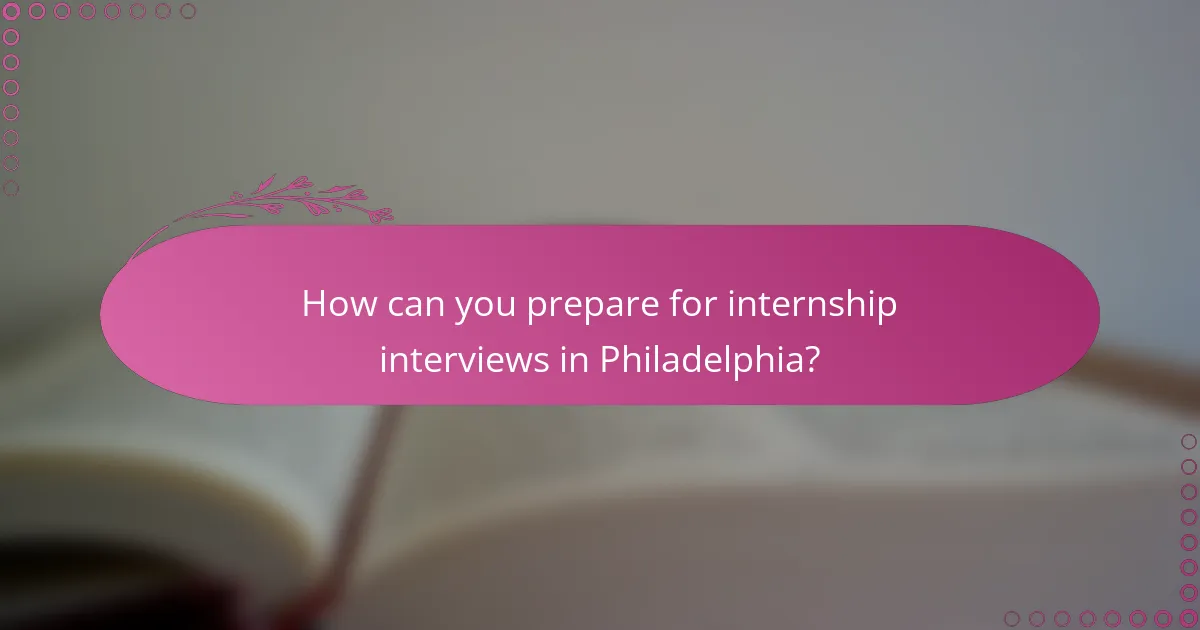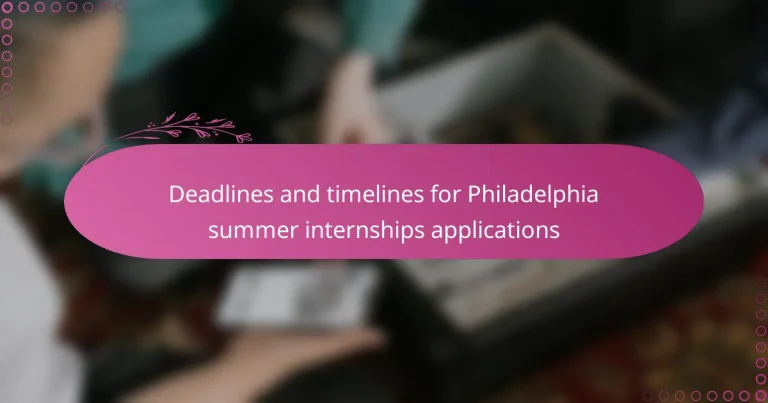

What are the key steps to secure a Philadelphia summer internship?
Research potential internship opportunities in Philadelphia. Utilize job boards, company websites, and university career services. Tailor your resume and cover letter for each application. Highlight relevant skills and experiences that match the internship requirements. Network with professionals in your field through LinkedIn and local events. Attend career fairs and informational interviews to make connections. Prepare for interviews by practicing common questions and researching the company. Follow up with a thank-you note after interviews to express your appreciation.
How can you identify potential internship opportunities in Philadelphia?
To identify potential internship opportunities in Philadelphia, utilize online job boards and company websites. Resources such as LinkedIn, Indeed, and Glassdoor list numerous internships. Networking events and career fairs are also effective for discovering openings. Local universities often have job portals for students. Additionally, connect with alumni through social media platforms. Research local industries to target specific companies. Engaging with professionals in your field can provide insider information on opportunities.
What resources are available for finding internships in Philadelphia?
Online job boards like Indeed and Glassdoor list numerous internships in Philadelphia. University career centers provide tailored resources for students seeking internships. Local organizations, such as the Greater Philadelphia Chamber of Commerce, offer internship listings and networking events. Social media platforms, particularly LinkedIn, are effective for connecting with potential employers. Networking events and career fairs in Philadelphia can also lead to internship opportunities. Professional associations in various fields often post internship openings on their websites. Local government websites may have internship programs, especially for students. Finally, industry-specific websites can provide niche internship listings relevant to specific career paths.
How can you leverage local job fairs and career events?
Attend local job fairs and career events to connect with potential employers. Prepare a polished resume to distribute to recruiters. Practice your elevator pitch to effectively introduce yourself. Research participating companies beforehand to tailor your conversations. Follow up with contacts after the event to reinforce connections. Utilize social media platforms like LinkedIn to expand your network. Engage in workshops or panels to gain insights from industry experts. According to the National Association of Colleges and Employers, 70% of jobs are found through networking, highlighting the importance of these events.
What qualifications do you need for a successful internship application?
Successful internship applications typically require relevant education, skills, and experience. Most internships expect candidates to be pursuing a degree related to the field. Employers value skills such as communication, teamwork, and problem-solving. Previous experience in similar roles, even if unpaid, can strengthen an application. Tailoring your resume and cover letter to highlight these qualifications is essential. Networking can provide insights into specific qualifications desired by companies. Researching the organization can also help align your qualifications with their needs. Ultimately, demonstrating a genuine interest in the field can enhance your candidacy.
What skills and experiences are employers looking for?
Employers are looking for skills such as communication, teamwork, and problem-solving. These skills are essential for effective collaboration and project execution. Additionally, technical skills relevant to the specific industry are highly valued. For example, proficiency in software tools or coding languages can set candidates apart.
Experience in internships or relevant volunteer work demonstrates practical application of skills. Employers prefer candidates who have real-world experience in their field. Leadership experience, even in informal settings, indicates a candidate’s ability to take initiative.
According to a survey by the National Association of Colleges and Employers (NACE), 73% of employers prioritize communication skills. Furthermore, 61% emphasize teamwork as a crucial skill. These statistics highlight the importance of both soft and hard skills in the job market.
How can you tailor your resume for Philadelphia internships?
To tailor your resume for Philadelphia internships, focus on local relevance and specific skills. Research the companies and industries in Philadelphia. Highlight experiences that align with their values and needs. Use keywords from the internship description in your resume. Showcase any local volunteer work or projects that demonstrate your commitment to the community. Include measurable achievements to illustrate your impact in previous roles. Customize your objective statement to reflect your interest in the Philadelphia market. This approach increases your chances of standing out to local employers.
What role does networking play in securing an internship?
Networking plays a crucial role in securing an internship. It connects candidates with industry professionals who can provide insights and opportunities. Networking can lead to referrals, which significantly increase the chances of landing an internship. According to a survey by LinkedIn, 85% of jobs are filled through networking. Engaging in networking events, such as career fairs or industry meetups, allows candidates to make valuable contacts. These connections can offer advice and mentorship, enhancing a candidate’s application. Additionally, many internships are not advertised publicly, making networking essential for discovering hidden opportunities.
How can you build a professional network in Philadelphia?
To build a professional network in Philadelphia, attend local industry events and networking meetups. Engage with professional organizations relevant to your field. Utilize platforms like LinkedIn to connect with local professionals. Volunteer for community events to meet individuals in your industry. Join alumni groups from local universities to expand your contacts. Participate in workshops and seminars to gain knowledge and make connections. Follow up with new contacts to maintain relationships. According to the Philadelphia Chamber of Commerce, networking is crucial for career advancement in the region.
What are effective strategies for reaching out to industry professionals?
Effective strategies for reaching out to industry professionals include personalized communication and leveraging mutual connections. Personalizing your message increases the likelihood of a response. Mentioning specific interests or projects shows genuine engagement.
Utilizing platforms like LinkedIn can help identify mutual connections. A warm introduction through a shared contact enhances credibility. Following up respectfully after initial outreach is crucial. It demonstrates persistence and interest without being intrusive.
Research indicates that tailored outreach increases response rates by up to 50%. A study by HubSpot found that personalized emails have a significantly higher open rate compared to generic messages.

How can you prepare for internship interviews in Philadelphia?
To prepare for internship interviews in Philadelphia, research the companies you are applying to. Understand their mission, values, and recent news. Tailor your resume and cover letter for each application. Practice common interview questions and prepare your own questions for interviewers. Dress appropriately for the company culture. Arrive early to the interview location to show punctuality. Follow up with a thank-you email after the interview. These steps can enhance your chances of securing an internship.
What common interview questions should you expect?
Common interview questions include inquiries about your strengths and weaknesses. Interviewers often ask about your previous work experience. They may also request examples of how you handled challenges. Questions about your career goals are common as well. Interviewers frequently ask why you are interested in the position. They might inquire about your knowledge of the company. Behavioral questions about teamwork and leadership are also expected. These questions help assess your fit for the role.
How can you effectively answer behavioral interview questions?
To effectively answer behavioral interview questions, use the STAR method: Situation, Task, Action, and Result. Start by describing the Situation and Task to provide context. Then, explain the Action you took to address the situation. Finally, share the Result to highlight the impact of your actions. This structured approach allows interviewers to understand your thought process and problem-solving skills. Research shows that using the STAR method increases clarity and helps candidates articulate their experiences effectively. According to a study by The Muse, candidates who prepare using structured methods perform better in interviews.
What are the best practices for presenting your skills during an interview?
To effectively present your skills during an interview, focus on clarity and relevance. Clearly articulate your skills using specific examples. Tailor your examples to the job description. This demonstrates your understanding of the role. Use the STAR method (Situation, Task, Action, Result) to structure your responses. This method provides a clear narrative of your experiences. Practice your delivery to enhance confidence and fluidity. Research the company to align your skills with their values. Engaging with the interviewer can create a more dynamic conversation. Lastly, be prepared to answer skill-related questions thoughtfully and concisely.
How can you research companies before an interview?
To research companies before an interview, start by visiting their official website. Review the “About Us” section to understand their mission and values. Check the latest news and press releases for current developments. Explore their social media profiles for insights into company culture. Use platforms like LinkedIn to see employee profiles and connections. Read employee reviews on sites like Glassdoor for firsthand experiences. Analyze their competitors to understand the industry landscape. Finally, prepare thoughtful questions based on your research to ask during the interview.
What information should you gather about a potential employer?
Gather information about the potential employer’s company culture, values, and mission. Understanding the company’s culture helps assess if it aligns with your personal values. Research the employer’s industry position and recent news to gauge stability and growth potential. Look into employee reviews on platforms like Glassdoor for insights into workplace satisfaction. Investigate the company’s products or services to understand their market offerings. Familiarize yourself with the leadership team and their backgrounds, as this can inform you about management styles. Analyze the employer’s diversity and inclusion initiatives to evaluate their commitment to a supportive workplace. Finally, explore any community involvement or corporate social responsibility efforts to see how they contribute to society.
How can understanding company culture impact your interview performance?
Understanding company culture can significantly enhance your interview performance. When candidates align their responses with the company’s values, they demonstrate cultural fit. This alignment can lead to stronger connections with interviewers. Research shows that companies prioritize cultural fit, with 88% of employers believing it’s essential for long-term success. Candidates who understand and articulate their fit within the culture can better showcase their potential contributions. This understanding allows candidates to tailor their examples and questions during the interview. Ultimately, it increases the likelihood of receiving a job offer.

What follow-up actions should you take after an internship interview?
Send a thank-you email to the interviewer within 24 hours. Express appreciation for the opportunity to interview. Reiterate your interest in the position. Mention something specific from the interview to personalize your message. This shows attentiveness and reinforces your qualifications. Follow up again if you do not hear back within a week or two. Inquire about the status of your application politely. This demonstrates continued interest and professionalism.
How important is it to send a thank-you note after an interview?
Sending a thank-you note after an interview is very important. It demonstrates professionalism and appreciation for the opportunity. A thank-you note can reinforce your interest in the position. It allows you to reiterate key points discussed during the interview. According to a survey by Accountemps, 80% of hiring managers appreciate receiving thank-you notes. This follow-up can help you stand out among other candidates. It also provides an additional chance to clarify any points or address questions. Overall, sending a thank-you note can positively impact the hiring decision.
What should you include in your thank-you note to make it effective?
An effective thank-you note should include a specific expression of gratitude. Clearly state what you are thankful for, such as the opportunity or assistance received. Personalize the note by mentioning a specific detail from your interaction, which shows attentiveness. Reinforce your interest in the position or relationship to maintain engagement. Keep the tone professional and concise, ideally no longer than a few sentences. A timely delivery, ideally within 24 hours, enhances the note’s impact. This approach is supported by communication best practices that emphasize personalization and promptness in professional correspondence.
What strategies can enhance your chances of landing an internship?
To enhance your chances of landing an internship, focus on building a strong resume and cover letter. Tailor these documents to highlight relevant skills and experiences. Networking plays a crucial role; connect with professionals in your desired industry through LinkedIn or local events. Additionally, practice for interviews by researching common questions and conducting mock interviews. Follow up with thank-you emails after interviews to express appreciation. These strategies increase visibility and demonstrate professionalism. Statistics show that networking can lead to job opportunities, as many positions are filled through referrals.
How can you utilize social media for internship opportunities?
Utilizing social media for internship opportunities involves actively engaging with platforms like LinkedIn, Twitter, and Facebook. Start by creating a professional profile that highlights your skills and experiences. Regularly post relevant content to showcase your knowledge and interests. Join industry-specific groups to network with professionals and fellow interns. Follow companies you are interested in to stay updated on internship postings. Engage with their content by liking and commenting to increase visibility. Use hashtags related to internships to reach a broader audience. According to a LinkedIn survey, 85% of jobs are filled through networking, emphasizing the importance of social media in your job search.
What are the benefits of joining professional organizations in your field?
Joining professional organizations in your field provides numerous benefits. These organizations offer networking opportunities that can lead to internships and job placements. Members gain access to industry-specific resources and knowledge. They often host workshops and seminars that enhance professional skills. Joining such organizations can also increase visibility within the industry. Members may receive exclusive job listings and career advancement resources. Additionally, being part of a professional organization can enhance credibility and professional reputation. Research indicates that networking through these organizations significantly increases the chances of securing job opportunities.
What are the best practices for succeeding in your summer internship?
To succeed in your summer internship, actively engage with your tasks and colleagues. Show initiative by volunteering for projects. Communicate clearly and professionally with your supervisor and team. Seek feedback regularly to improve your performance. Building relationships with coworkers enhances collaboration and networking. Set specific goals for your internship to stay focused. Document your achievements to showcase your contributions. According to a survey by the National Association of Colleges and Employers, internships significantly improve job prospects for graduates.
How can you make a positive impression during your internship?
To make a positive impression during your internship, demonstrate professionalism and enthusiasm. Arrive on time and dress appropriately for the workplace. Engage actively in tasks and show willingness to learn. Communicate effectively with colleagues and supervisors. Ask questions to clarify your responsibilities and seek feedback regularly. Take initiative by volunteering for additional tasks when possible. Maintain a positive attitude, even in challenging situations. These behaviors are recognized as key factors in leaving a good impression during internships.
What steps can you take to maximize your learning experience?
To maximize your learning experience, actively engage with the material. Take detailed notes during lectures or readings. Participate in discussions to clarify concepts. Set specific learning goals to track your progress. Utilize various resources like books, articles, and online courses. Seek feedback from peers or mentors to improve. Reflect on your learning regularly to identify areas for growth. Research shows that active engagement enhances retention and understanding.
The main entity of the article is securing a summer internship in Philadelphia. The article provides a comprehensive guide on identifying potential internship opportunities, leveraging local job fairs, and preparing effective applications. It outlines essential qualifications, skills sought by employers, and strategies for tailoring resumes and cover letters. Additionally, the article emphasizes the importance of networking and offers interview preparation tips, including common questions and best practices for follow-up communication. Overall, it serves as a valuable resource for candidates aiming to enhance their internship prospects in Philadelphia.




